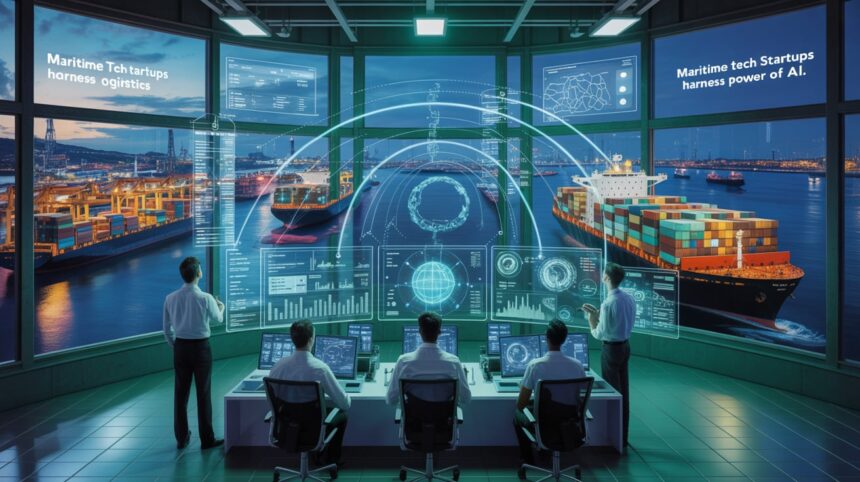Maritime tech startups harness power of AI this phrase isn’t just a headline; it’s the reality shaping the future of global shipping, ports, and logistics in 2025. If you’re wondering why so many new companies are betting big on artificial intelligence, or what this means for the industry, you’re in the right place. Let’s break down the facts, the opportunities, and the real-world impact, all through the lens of how maritime tech startups harness power of AI.
Why Is Everyone Talking About Maritime Tech Startups Harness Power of AI?
The maritime industry has always been a tough business. Margins are thin, risks are high, and the pressure to deliver on time is relentless. Add in new environmental regulations, the demand for transparency, and the need to cut costs and you’ve got a sector ripe for disruption. That’s exactly why maritime tech startups harness power of AI: to solve these pain points and unlock new value.
In 2025, nearly half of all maritime tech startups are using artificial intelligence to drive smarter, faster, and greener operations. This isn’t hype it’s a response to real-world challenges like unpredictable weather, rising fuel costs, and the complexity of global supply chains.
The Importance of AI for Maritime Startups
Let’s get real: the old ways of doing things just don’t cut it anymore. AI is helping startups:
- Optimize shipping routes in real time, saving fuel and reducing emissions.
- Predict equipment failures before they cause costly delays.
- Automate cargo handling and documentation, slashing paperwork and human error.
- Enhance crew safety and security with smarter monitoring.
- Stay ahead of regulatory demands with automated compliance tools.
In short, when maritime tech startups harness power of AI, they’re not just keeping up they’re setting the pace.
What Are the Top Questions About Maritime Tech Startups Harness Power of AI?
How Are Startups Using AI in Maritime Operations?
AI is everywhere in the new wave of maritime technology. Here’s how:
- Route Optimization: AI analyzes weather, sea traffic, and port congestion to plot the most efficient course.
- Predictive Maintenance: Machine learning models use sensor data to flag engine or equipment issues before they become failures.
- Autonomous Vessels: Some startups are developing ships that can navigate and dock themselves.
- Cargo Optimization: AI-driven algorithms figure out the best way to load, store, and track containers for maximum efficiency.
- Regulatory Compliance: Automated systems generate reports and monitor emissions to ensure ships meet international standards.
Why Are Investors Pouring Money Into These Startups?
The numbers don’t lie: in the last year alone, maritime tech startups harness power of AI to attract over $234 million in funding, up 73% from the previous year. Why? Because AI isn’t just a buzzword it’s delivering real, measurable results. Investors see the potential for AI-driven startups to disrupt the market, cut costs, and create new business models that legacy players can’t match.
What Are the Biggest Wins So Far?
- Orca AI raised $72.5 million in 2025 for its collision-avoidance and navigation platform, now used by major shipping lines.
- Marcura acquired Shipster, an AI-powered document intelligence company, to automate charter party interpretation and risk assessment.
- Flagship Founders reported that 45% of maritime tech startups now use AI, up from just 27.5% the year before.
These aren’t just big numbers they’re proof that maritime tech startups harness power of AI to solve real problems and win market share.
Real-World Examples: How Maritime Tech Startups Harness Power of AI
Let’s look at some practical, on-the-water examples:
- Route Optimization: Bearing AI’s platform helps ships avoid storms, reduce fuel use, and arrive on time, using real-time data from weather satellites and port sensors.
- Predictive Maintenance: Maersk Line uses AI to monitor engine health, cutting unscheduled downtime by up to 20%.
- Cargo Management: Blockshipping uses AI to track containers across the globe, reducing lost cargo and improving supply chain visibility.
- Autonomous Navigation: Yara Birkeland, the world’s first autonomous container ship, uses AI for route planning, docking, and collision avoidance.
Table: AI Applications by Startup Focus Area
| Startup Focus Area | How AI Is Used | Example Startup | Impact |
|---|---|---|---|
| Route Optimization | Real-time data analysis for best routes | Bearing AI | Lower fuel, fewer delays |
| Predictive Maintenance | Sensor data to predict equipment failures | Maersk Line | Less downtime, lower costs |
| Autonomous Navigation | Self-steering, collision avoidance | Orca AI, Yara Birkeland | Safer, more efficient voyages |
| Cargo Optimization | Smart loading, container tracking | Blockshipping | Faster ports, less lost cargo |
| Compliance Automation | Emission monitoring, auto-reporting | Marcura, Alpha Ori | Regulatory peace of mind |
What Mistakes Do Startups Make When Using AI in Maritime?
- Underestimating Data Needs: AI is only as good as the data you feed it. Many startups struggle with poor-quality or incomplete data from ships and ports.
- Ignoring Cybersecurity: As ships get smarter, they also get more vulnerable to hacking and cyberattacks.
- Overpromising, Under-delivering: Some startups claim their AI can do everything, but real-world conditions are messy and unpredictable.
- Not Training the Crew: Technology is only part of the solution crews need training to trust and use AI tools effectively.
About Maritime Tech Startups Harness Power of AI
- AI will replace all human jobs at sea.
- Reality: AI is a tool to help crews make better decisions, not a replacement for skilled mariners.
- Only big companies can afford AI.
- Reality: Startups are often the most agile and innovative, using cloud-based AI tools that scale with their needs.
- AI is just automation.
- Reality: AI goes beyond automation by learning from data and adapting to new situations in real time.
How to Get Started: Tips for Startups and Operators
- Start Small: Pilot AI in one area like route planning or maintenance before rolling it out fleet-wide.
- Partner Up: Collaborate with tech firms, universities, and other startups to share data and expertise.
- Focus on ROI: Track the impact of AI on fuel savings, downtime, and customer satisfaction.
- Invest in Training: Make sure your team understands both the potential and the limits of AI.
- Stay Agile: The tech is moving fast be ready to pivot as new tools and standards emerge.
The Future: What’s Next for Maritime Tech Startups Harness Power of AI?
- Fully Autonomous Ships: The dream of crewless vessels is getting closer, with AI at the helm.
- Smart Ports: Ports will use AI to manage traffic, automate cranes, and optimize logistics in real time.
- Greener Shipping: AI will help the industry meet tough new emissions targets by optimizing every aspect of operations.
- Connected Ecosystems: Ships, ports, and logistics providers will share data seamlessly, creating a truly intelligent supply chain.
Semantic Variations and Synonyms Used
- maritime AI startups
- artificial intelligence in shipping
- AI-powered maritime innovation
- smart shipping technology
- digital transformation in maritime
- AI-driven logistics
- autonomous shipping solutions
- predictive analytics for shipping
User Queries: Quick Answers
Q: How much are maritime tech startups investing in AI?
A: In 2025, over $234 million was invested in AI-powered maritime startups, a 73% increase from the previous year.
Q: What’s the biggest benefit of AI for maritime startups?
A: Efficiency AI helps cut fuel costs, reduce downtime, and improve safety, all of which boost the bottom line.
Q: Are there risks to using AI in shipping?
A: Yes. Data quality, cybersecurity, and the need for crew training are major challenges, but the benefits often outweigh the risks if managed well.
Q: Can small shipping companies use AI?
A: Absolutely. Many startups offer cloud-based AI solutions that scale to any fleet size, making advanced tech accessible to all.
Summary: Why Maritime Tech Startups Harness Power of AI Is the Game Changer
In 2025, maritime tech startups harness power of AI not just because it’s trendy, but because it’s essential for survival and growth. From smarter routes to safer ships and greener ports, AI is the engine driving the next wave of innovation in shipping. If you’re in the industry, now’s the time to get on board or risk being left behind.






